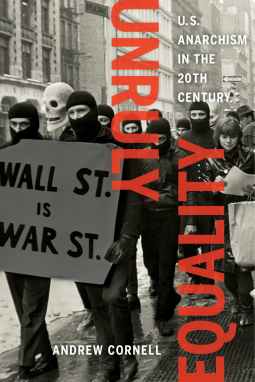
Unruly Equality
U.S. Anarchism in the Twentieth Century
by Andrew Cornell
This title was previously available on NetGalley and is now archived.
Buy on Amazon
Buy on BN.com
Buy on Bookshop.org
*This page contains affiliate links, so we may earn a small commission when you make a purchase through links on our site at no additional cost to you.
Send NetGalley books directly to your Kindle or Kindle app
1
To read on a Kindle or Kindle app, please add kindle@netgalley.com as an approved email address to receive files in your Amazon account. Click here for step-by-step instructions.
2
Also find your Kindle email address within your Amazon account, and enter it here.
Pub Date Jan 13 2016 | Archive Date Aug 19 2016
Description
The first intellectual and social history of American anarchist thought and activism across the twentieth century
In this highly accessible history of anarchism in the United States, Andrew Cornell reveals an astounding continuity and development across the century. Far from fading away, anarchists dealt with major events such as the rise of Communism, the New Deal, atomic warfare, the black freedom struggle, and a succession of artistic avant-gardes stretching from 1915 to 1975.
Unruly Equality traces U.S. anarchism as it evolved from the creed of poor immigrants militantly opposed to capitalism early in the twentieth century to one that today sees resurgent appeal among middle-class youth and foregrounds political activism around ecology, feminism, and opposition to cultural alienation.
In this highly accessible history of anarchism in the United States, Andrew Cornell reveals an astounding continuity and development across the century. Far from fading away, anarchists dealt with major events such as the rise of Communism, the New Deal, atomic warfare, the black freedom struggle, and a succession of artistic avant-gardes stretching from 1915 to 1975.
Unruly Equality traces U.S. anarchism as it evolved from the creed of poor immigrants militantly opposed to capitalism early in the twentieth century to one that today sees resurgent appeal among middle-class youth and foregrounds political activism around ecology, feminism, and opposition to cultural alienation.
Advance Praise
"Points to a growing interest in the study of
American anarchist history for readers of political and social
history."—Library Journal
“Filled with unforgettable characters, plain heroism, impressive archival discoveries, and tough-minded judgments, Unruly Equality sharply challenges the view that the twentieth century saw anarchist activism and thought thoroughly eclipsed by the ascendancy of scientific socialism within social movements. Influential within campaigns for empowering immigrant workers, African Americans opposing Jim Crow, peacemakers, and the artistic imagination, the anarchists whose lives Cornell so dramatically recovers tested and reinvented their ideas in struggle.”—David Roediger, author of Seizing Freedom: Slave Emancipation and Liberty for All
“Unruly Equality is history for movement builders. In recovering the captivating story of twentieth-century U.S. anarchism, Cornell provides crucial insights into the development of direct democracy, non-hierarchy, prefiguration, and other concepts animating contemporary global movements. Highly readable and theoretically sharp, this book is a vital tool for world changers and scholars alike.”—Marina A. Sitrin, author of Everyday Revolutions: Horizontalism and Autonomy in Argentina
“Unruly Equality shows that a new version of anarchist politics emerged in the postwar decades that was critical of mainstream culture and intent on challenging authority and transforming everyday life; the radical politics of the ’60s, which at the time seemed to come out of nowhere, had roots in fact in the new anarchism of the previous decades. Cornell’s scholarly—and at the same time lively and engaging—account of radical politics in a little-studied period gives us a deeper understanding of the development of radical politics in the latter half of the twentieth century. This book is crucial reading for anyone interested in that history.”—Barbara Epstein, author of The Minsk Ghetto 1941–1943: Jewish Resistance and Soviet Internationalism
“Filled with unforgettable characters, plain heroism, impressive archival discoveries, and tough-minded judgments, Unruly Equality sharply challenges the view that the twentieth century saw anarchist activism and thought thoroughly eclipsed by the ascendancy of scientific socialism within social movements. Influential within campaigns for empowering immigrant workers, African Americans opposing Jim Crow, peacemakers, and the artistic imagination, the anarchists whose lives Cornell so dramatically recovers tested and reinvented their ideas in struggle.”—David Roediger, author of Seizing Freedom: Slave Emancipation and Liberty for All
“Unruly Equality is history for movement builders. In recovering the captivating story of twentieth-century U.S. anarchism, Cornell provides crucial insights into the development of direct democracy, non-hierarchy, prefiguration, and other concepts animating contemporary global movements. Highly readable and theoretically sharp, this book is a vital tool for world changers and scholars alike.”—Marina A. Sitrin, author of Everyday Revolutions: Horizontalism and Autonomy in Argentina
“Unruly Equality shows that a new version of anarchist politics emerged in the postwar decades that was critical of mainstream culture and intent on challenging authority and transforming everyday life; the radical politics of the ’60s, which at the time seemed to come out of nowhere, had roots in fact in the new anarchism of the previous decades. Cornell’s scholarly—and at the same time lively and engaging—account of radical politics in a little-studied period gives us a deeper understanding of the development of radical politics in the latter half of the twentieth century. This book is crucial reading for anyone interested in that history.”—Barbara Epstein, author of The Minsk Ghetto 1941–1943: Jewish Resistance and Soviet Internationalism
Available Editions
| EDITION | Other Format |
| ISBN | 9780520286757 |
| PRICE | $29.95 (USD) |



